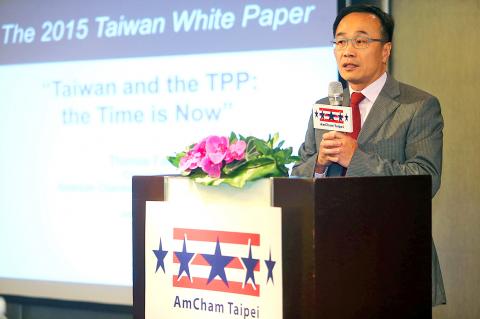The American Chamber of Commerce (AmCham) in Taipei yesterday called on the government to adopt a more effective approach to join the Trans-Pacific Partnership (TPP) by forming a task force to accelerate progress.
The group’s call came after the nation’s efforts to become a candidate for second-round entry have remained in limbo over the past year.
As the 12-member trade bloc is likely to be formed next year, Taiwan needs to take decisive action to establish its credibility for trade liberalization, AmCham said.

Photo: CNA
“We are really worried that Taiwan will be marginalized [economically] as the world is moving forwards,” AmCham chairman Thomas Fann (范炘) told a press conference as the group issued its annual White Paper, adding that the China-South Korea free-trade agreement took effect this week, while the US is in talks with the EU over the Transatlantic Trade and Investment Partnership.
“Participating in a big trade organization will be a good way [to avoid such a risk],” Fann said.
The TPP represents a huge market, as the 12 economies involved produce more than 40 percent of global GDP, he said.
Joining the trade bloc would also help Taiwan reduce its reliance on China and rebalance its trade long term, he added.
In the White Paper, AmCham suggested that the Executive Yuan could create a TPP task force to ensure that the individual ministries and agencies carry out the necessary reforms.
The task force should oversee communications with the public and the legislature to build a sense of national mission behind TPP accession, it said.
Fann said the government should tap a high-ranking government official to lead the task force.
A political heavyweight with national recognition, such as former vice president Vincent Siew (蕭萬長), would be an ideal candidate, he said.
AmCham also warned that no invitations would be issued to join the TPP as some government agencies and private think tanks seem to imagine.
“Would-be candidates must apply,” the business group said in the White Paper.
Of the 12 members of the TPP, Taiwan has signed free-trade agreements with just New Zealand and Singapore, Fann said.
Taiwan needs to accelerate its efforts to become qualified by holding talks with those countries to solve existing, or potential, trade disputes, he said.
“Joining the TPP would make Taiwan a springboard for foreign companies to enter the trade bloc,” Fann said.
In response, the National Development Council said that as the government already has an international trade and economic task force, it would not consider forming another one.
The task force is convened by Vice Premier Simon Chang (張善政) every two to three months.
It requires ministries to report the latest progress on efforts to join the TPP, the council said.
The council said the government would continue deepening structural reforms and improve the business-related legal system in a bid to create a better environment for joining regional economic pacts.
“We hope the American Chamber of Commerce in Taipei continues to voice its support for Taiwan participating in the TPP second-round negotiations,” the council said.
Additional reporting by Lauly Li

The CIA has a message for Chinese government officials worried about their place in Chinese President Xi Jinping’s (習近平) government: Come work with us. The agency released two Mandarin-language videos on social media on Thursday inviting disgruntled officials to contact the CIA. The recruitment videos posted on YouTube and X racked up more than 5 million views combined in their first day. The outreach comes as CIA Director John Ratcliffe has vowed to boost the agency’s use of intelligence from human sources and its focus on China, which has recently targeted US officials with its own espionage operations. The videos are “aimed at

STEADFAST FRIEND: The bills encourage increased Taiwan-US engagement and address China’s distortion of UN Resolution 2758 to isolate Taiwan internationally The Presidential Office yesterday thanked the US House of Representatives for unanimously passing two Taiwan-related bills highlighting its solid support for Taiwan’s democracy and global participation, and for deepening bilateral relations. One of the bills, the Taiwan Assurance Implementation Act, requires the US Department of State to periodically review its guidelines for engagement with Taiwan, and report to the US Congress on the guidelines and plans to lift self-imposed limitations on US-Taiwan engagement. The other bill is the Taiwan International Solidarity Act, which clarifies that UN Resolution 2758 does not address the issue of the representation of Taiwan or its people in

US Indo-Pacific Commander Admiral Samuel Paparo on Friday expressed concern over the rate at which China is diversifying its military exercises, the Financial Times (FT) reported on Saturday. “The rates of change on the depth and breadth of their exercises is the one non-linear effect that I’ve seen in the last year that wakes me up at night or keeps me up at night,” Paparo was quoted by FT as saying while attending the annual Sedona Forum at the McCain Institute in Arizona. Paparo also expressed concern over the speed with which China was expanding its military. While the US

SHIFT: Taiwan’s better-than-expected first-quarter GDP and signs of weakness in the US have driven global capital back to emerging markets, the central bank head said The central bank yesterday blamed market speculation for the steep rise in the local currency, and urged exporters and financial institutions to stay calm and stop panic sell-offs to avoid hurting their own profitability. The nation’s top monetary policymaker said that it would step in, if necessary, to maintain order and stability in the foreign exchange market. The remarks came as the NT dollar yesterday closed up NT$0.919 to NT$30.145 against the US dollar in Taipei trading, after rising as high as NT$29.59 in intraday trading. The local currency has surged 5.85 percent against the greenback over the past two sessions, central